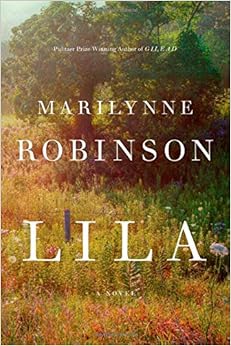Marilynne Robinson's Gilead and Home tell two sides--let's say faces, like a polygon--of a story about a pair of families in rural Iowa in the mid-20th century. Gilead, a lyrical novel written as a series of letters from the aging Reverend John Ames to the child he knows he will leave behind, is a beautiful but muted reflection on death and the bittersweetness of leaving a life behind you. Home, about the prodigal son Jack Boughton (son of Ames' best friend), is about trying to create or recover a home that has long been broken, but compared to Gilead, it felt to me relatively stale and saccharine.
Lila tells the story of Ames' wife, a formerly vagrant drifter who finds herself thrust together with the much older Ames, and who asks him to marry her on an impulse. Soon, she is carrying the child who will become the son who is the recipient of the letters of Gilead. It's not in the first perspective, but the strength of voice that was missing in Home returns here, modulating Robinson's perfect liturgical prose with Lila's earthier language and mannerisms. Lila also reaches back to Robinson's first novel, Housekeeping, for a sense of wildness and danger that the two other novels, meditative and sedate, largely forego.
The narrative begins when Lila is a child, viciously neglected by her family. She's stolen away by a boarder named Doll, and they live for years together with a small band of migrant workers who drift throughout the Midwest. She learns to trust no one except for Doll; she learns how to use a knife for fishing, cleaning, self-defense. Eventually, Doll is arrested for using her knife--how exactly, and to what extent is never clear, but it seems to be on some member of Lila's family who's come looking for her--and the two part ways forever. This parting lingers in Lila's spirit; without Doll she seems both lost to the world and vice versa.
In Ames' home, the two pass the time talking about the Bible. Lila is attracted to a passage from Ezekiel, when God talks about his rescuing the nation of Israel: "And when I passed by thee, and saw thee weltering in thy blood, I said unto thee, Though thou art in the blood, live; yea, I said unto thee, Though thou art in thy blood, live." She sees God's pity for Israel in Doll's pity for herself, a pity which she struggles to comprehend and honor. She is smart, though uneducated, and challenges the staid Calvinist Ames in his views. She chafes against thinking of Doll as unbaptized and lost:
Doll probably didn't know she had an immortal soul. It was nothing she ever mentioned, if she ever thought about it. She probably wouldn't even have known the words for it. All those people out there walking the roads all those ears, hardly a one of them remembering the Sabbath. Who would work when there was work to be done? What use was there in calling a day by a certain name, or thinking of it as anything but the weather? They knew what time of the year it was the timothy bloomed, when the birds were fledging. They knew it was morning when the sun came up. What more was there to know? If Doll was going to be lost forever, Lila wanted to be right there with her, holding to the skirt of her dress.
Ames, and Robinson, come pretty close to answering this question with the idea of universal salvation. Ames says,
If the Lord is more gracious than any of us can begin to imagine, and I'm sure He is, then your Doll and a whole lot of people are safe, and warm, and very happy. And probably a little bit surprised. If there is no Lord, then things are just the way they look to us. Which is really much harder to accept. I mean, it doesn't feel right. There has to be more to it all, I believe.
Lila isn't a theological tract (and not half as close to one as Gilead), but rather an exploration of human uncertainty, and the valuable wisdom of instinct. Lila's intelligence challenges Ames, and you get the sense that it challenges Robinson, as well, who carves a space for comfort for her characters without simple answers. Though Lila seems to constantly have one foot out the door, called back by her life of wildness, she ultimately comes to recognize domestic tranquility as a kind of divine grace, a manifestation of the kind of pity that looks on a child weltering in its own blood and cares for it. And then, with the birth of her son (who, as we know, will eventually be orphaned) she becomes a participant in that grace as well.
Lila is a staggeringly beautiful book. I was disappointed that Home was such a bore, since Gilead strikes me as one of the best--maybe the best--novel of the 21st century. But perhaps it was merely a sign that she's a human being. Lila is almost as good, which is saying quite a lot.


3 comments:
Ok, so here's my question: I read Gilead several years ago and loved it, but don't remember it that well. I did not read Home. If I just go back and refresh on the Gilead wikipedia page will that be enough to enjoy/understand Lila? Or should I read Home first?
You don't NEED to have read either one at all. Home takes place way after the events of this book, for one.
Actually, both do.
Post a Comment